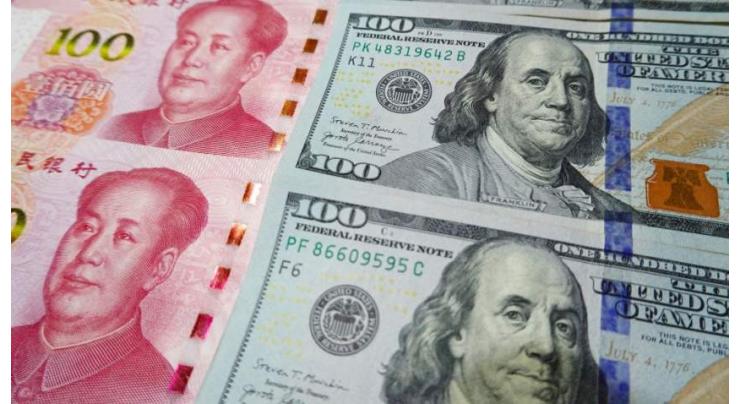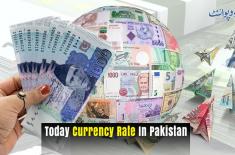
US Dollar's Dominance Declining But Long Way From Being Dethroned By China's Yuan
Muhammad Irfan Published April 13, 2023 | 07:07 PM

The US dollar's dominance is declining on the global stage but it is far from being dethroned by the Chinese yuan regardless of an increase of its use with other trading partners over the years, including some considered close US allies, experts told Sputnik
WASHINGTON (UrduPoint News / Sputnik - 13th April, 2023) The US dollar's dominance is declining on the global stage but it is far from being dethroned by the Chinese yuan regardless of an increase of its use with other trading partners over the years, including some considered close US allies, experts told Sputnik.
The yuan replaced the dollar as the most traded currency in Russia last week and continues to penetrate a number of other markets around the world.
"China has been strategically attacking the dollarization of the world for years through the People's Bank of China and global strategic partnerships with Russia and Brazil, while making inroads in the European Union with France, for example, completing their first LNG trade using the yuan," Michigan State University marketing and international business professor Tomas Hult told Sputnik.
An additional reason for de-dollarization of the global economy can be traced to the uncertainty created by the Ukraine conflict, European interests aligned with the Euro, and Brazil and China agreeing to use the Chinese Yuan in cross-border transactions, Hult added.
It remains to be seen whether yuan-stabilizing mechanisms by The People's Bank of China will be viewed by the United States and the rest of the world as a long-term market-based financial strategy, according to Hult.
Information Technology and Innovation Foundation President Robert Atkinson told Sputnik the dominance of the US dollar is decreasing slowly, while investors lose faith in the ability of the US government to pay debt service.
"The forces that are weakening it are the declining relative strength of the US economy, especially compared to China, as well as the massive and growing US federal budget deficit," the head of the DC-based think tank said.
Geneva Center for Security Policy Executive Fellow Ali Ahmadi told Sputnik de-dollarization is going to be a difficult process considering the world has long had one currency that serves as the common medium of exchange, but US sanctions are pushing many countries to seek alternative methods to conduct trade.
"Right now, especially due to US sanctions policies, there are many countries that are interested in finding convenient and affordable ways of carrying out cross border transactions with other currencies," Ahmadi said.
American Enterprise Institute senior fellow Derek Scissors, citing the International Monetary Fund (IMF) noted the dollar's share of official foreign exchange reserves have been on the decline over the last decade, most recently dropping to 58% at the end of 2022, but it continues to reign in the global market.
"It will take close to 30 years for it to fall below 50%," Scissors told Sputnik. "There's no replacement currency. The nearest competitor is the euro at 19%, but the euro's use outside the EU is minor."
CHINESE YUAN RALLY SUSTAINABLE?
The current rally of the Chinese Yuan that began years ago is very sustainable due to China's monetary policies, Hult said.
"The People's Bank of China, the country's central bank, changed its formula for calculating the reference rate of the yuan (RMB) in 2015 to incorporate market forces." Hult said. "In effect, at that time China shifted its focus strategically and opted to focus on social stability, steady growth, and maintaining the Chinese market as an attractive investment instead of.
.. continuing to focus on only the long run of unprecedented growth."
Ahmadi added that the yuan is a good option, but most interest in it involves trade directly with China. However, a key problem is that China's capital controls make the yuan less convertible or predictable than the dollar.
Countries around the world are involved in a variety of projects to lessen their dependency on the dollar, which will likely bear some fruit in the form of other currencies being used more and creating their own sphere rather than the United States being dethroned as the primary currency used for reserves and exchanges, Ahmadi said.
Scissors pointed out that since the yuan started to move against the dollar in 2010, it fluctuated less than 10% in either direction from the mean of below 6.8. The equivalent numbers for the yen are about 20% toward a higher value and 30% toward a lower, and Japan's economy is stagnant, while China's is supposedly dynamic, he added.
"This is because China does not allow yuan to freely leave the country and thus needs an additional benchmark to set its value," Scissors said. "That benchmark is the dollar - the yuan is a dollar instrument. When countries 'substitute' the yuan for the dollar, they are just substituting one form of the dollar for another. This will remain true until China liberalizes."
IMPLICATIONS OF US DOLLAR DECLINING IN GLOBAL ECONOMY
De-dollarization of the global economy would have mixed effects from reducing the power of the United States through its economy while helping reduce the US annual trade deficit, Atkinson said.
"It would on the one hand reduce the power that the US government has from the dollar being the reserve currency - other countries would be less dependent on the dollar," Atkinson said. "On the other hand, de-dollarization would mean that the value of the dollar would fall from its artificially high level, making US exports more competitive and bringing down the current $1 trillion annual trade deficit. This is critical if the United States is to effectively compete with China in a host of advanced industries."
The appreciation of the yuan over the years, at the People's Bank of China, helped slow the Chinese economy from double-digit growth to single digits, Hult said. It has also meant that strategically, China opted to focus on social stability, steady growth, and maintaining the Chinese market as an attractive investment instead of the long run of unprecedented growth, he added.
However, it remains to be seen whether China's stabilizing mechanisms will be viewed by the US and the rest of the world as currency manipulations or as more market-based financial strategy, according to Hult.
Hult also said China remains an incredibly important market, and global shifts and stronger emphases on Beijing's country-level strategic partnerships amid a more polarizing political landscape in the United States - which may be viewed by governments around the world as a de-stabilizing force - open the doors for continued de-dollarization of the global economy.
Related Topics
Recent Stories

Currency Rate In Pakistan - Dollar, Euro, Pound, Riyal Rates On 9 May 2025

Today Gold Rate in Pakistan 09 May 2025

DB suspends contempt proceeding against DG I&P, Director NAB

Read Pakistan hosts art exhibition

DC Kohat chairs meeting to review anti-polio campaign

Divisional Control Room established in Mirpurkhas for emergency response

So far no location targeted in IIoJK or across int'l border: Atta Tarar

Combating emergent situations: Emergency response centers being set up in AJK.

People, political leadership united to thwart India's aggression with full vigor ..

Sunni Ulema Council holds demo against Indian attacks

Sindh Govt decides to crackdown who don’t accept Debit/Credit card payments

Nation stand united with Pak Armed Forces to defuse aggressive designs of India: ..
More Stories From Business
-

Currency Rate In Pakistan - Dollar, Euro, Pound, Riyal Rates On 9 May 2025
8 minutes ago -

Today Gold Rate in Pakistan 09 May 2025
1 hour ago -

Pakistan's total liquid foreign reserves $ 15.48 billion
13 hours ago -

Securities and Exchanges of Commission of Pakistan registers 2,956 new companies in April 2025
13 hours ago -

Ministry committed to strengthening agriculture for a green Pakistan: Minister of State for National ..
13 hours ago -

FCCI President, Commerce Minister discusses tariff Reforms export facilitation
13 hours ago
-

Projects aligned with Uraan Pakistan Program to be included in next development budget: Ahsan Iqbal
13 hours ago -

Finance minister highlights macroeconomic gains at ‘Pakistan Access Day’ Moot in London
13 hours ago -
SCCI SVP meets Global SME advisor
16 hours ago -
PSX stays bearish, loses 6,482 more points
17 hours ago -
Gold prices decrease Rs.4,200 to 352,700 per tola
17 hours ago -
SAPM Haroon interacts with KCCI to resolve business community's issues
17 hours ago













